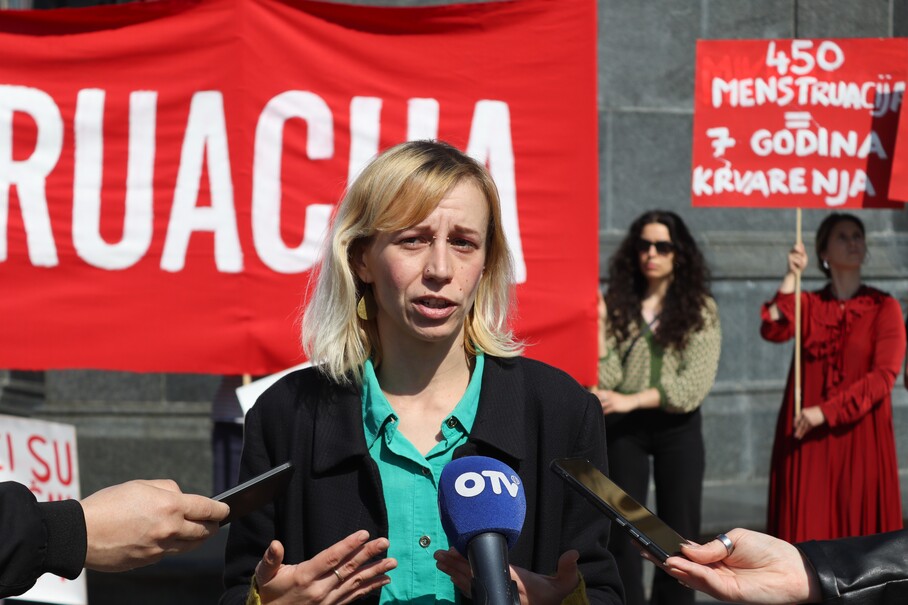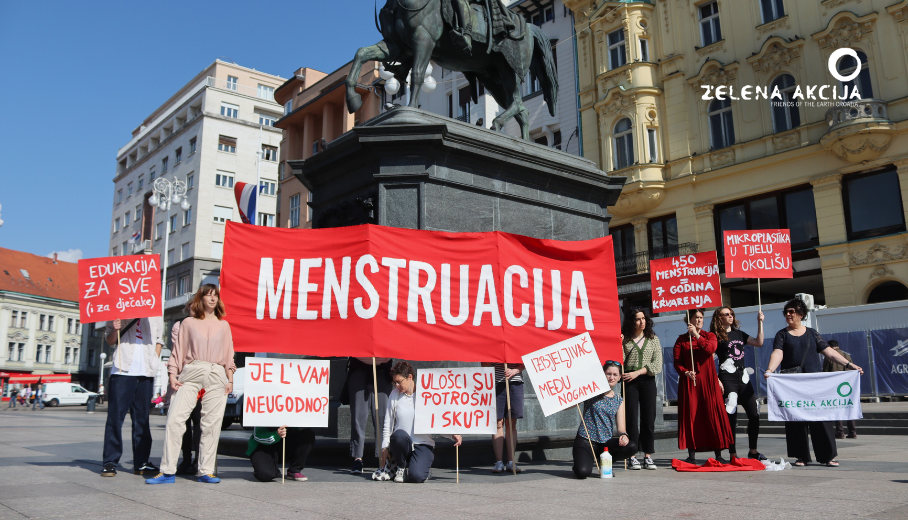It’s time to break the silence and menstruate without shame!
Zelena akcija / FoE Croatia is calling on decision-makers to introduce comprehensive health education, ensure the availability and affordability of reusable menstrual products, and regulate the use of harmful chemicals in single-use products.
To mark Menstrual Poverty Week, FoE Croatia activists held a demonstration in Zagreb’s main square, drawing attention to the stigma and poverty surrounding menstruation. They displayed a large banner reading “Menstruation”, and the action was supported by activists from organisations across Europe.
“We must speak openly about menstruation because the stigma surrounding it is deeply rooted. It stands in the way of menstrual health, sustainability, and access to essential products. This stigma stifles public discourse and allows the disposable products industry to continue offering harmful items by employing shaming tactics”, said Ana-Marija Mileusnić from FoE Croatia.

Reusable and sustainable menstrual products are more cost-effective, healthier, and environmentally friendly. However, their widespread acceptance requires breaking taboos through education, awareness campaigns, and financial incentives such as vouchers. FoE Croatia and its partner organisations are actively working to raise awareness and inform the public about the benefits of reusable options and the dangers of single-use ones.
“The lack of quality health education in school curricula further deepens the stigma. Menstruation is often taught solely as a biological reproductive function, excluding boys from the conversation and overlooking its entanglement with patriarchal culture, teasing, and experiences of pain”, Mileusnić emphasised. She added that girls* are taught to hide their menstruation, while boys are taught not to talk about it, and any mention of it is accompanied by shame. “Even Croatian terms for female reproductive organs—such as rodnica (vagina) and stidnica (vulva)—carry connotations of shame and reproduction as their primary function.”
Advertisements continue to perpetuate these taboos by portraying menstruation as something unclean, offering scented disposable products as a “solution” to invented “unpleasant odours” that stem from a culture of shame, not from the body itself. Such practices—along with the high cost of menstrual products, especially sustainable alternatives—further the notion that menstruation is a luxury rather than a basic need. “No one should be forced to buy cheap and toxic products”, Mileusnić stated. She believes that, instead, harmful chemicals should be regulated and such products should be removed from the market entirely and replaced with safe, health-conscious alternatives.
“Unfortunately, in Croatia, the ecological and health aspects of menstruation receive little attention. This shifts focus away from the dangers of single-use plastics and toxic chemicals, while safe and sustainable alternatives remain inaccessible to many”, Mileusnić said.
She believes Croatia should follow good practice examples and, like the Catalan government, take a decisive stand against menstrual poverty. For example, the Croatian Institute of Public Health should provide education for pharmacy and healthcare workers on the proper use of reusable menstrual products. This would enable menstruating individuals to access reliable information from professionals without relying on the internet. Pharmacies could then be equipped to distribute free reusable menstrual products on request via vouchers, as successfully implemented in Catalonia.
“To conclude, we call on the media to stop perpetuating harmful stereotypes and to foster open dialogue. We call on society as a whole to speak out about menstruation without shame, so that we can create a healthier, more equal and sustainable environment for everyone”, Mileusnić concluded.
---
*The terms 'women' and 'girls' are used here to refer to a non-binary social category that includes all those who identify with it, including trans and intersex individuals.

